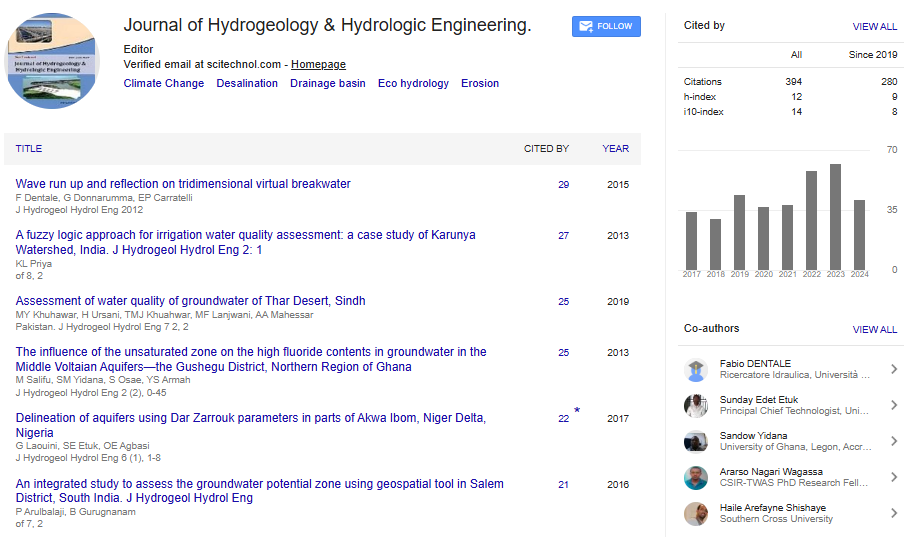Commentary, J Hydrogeol Hydrol Eng Vol: 12 Issue: 1
The Study of Earth's Water Cycle
Francisco Balocchi*
Department of Environmental Science, Baylor University, Waco, United States
*Corresponding Author: Francisco Balocchi
Department of Environmental
Science, Baylor University, Waco, United States
E-mail: balocchif52@gmail.com
Received date: 24 January, 2023, Manuscript No. JHHE-23-90698;
Editor assigned date: 26 January, 2023, PreQC No. JHHE-23-90698 (PQ);
Reviewed date: 09 February, 2023, QC No. JHHE-23-90698;
Revised date: 16 February, 2023, Manuscript No. JHHE-23-90698 (R);
Published date: 24 February, 2023, DOI: 10. 4172/2325-9647.1000250
Citation: Balocchi F (2023) The Study of Earth's Water Cycle. J Hydrogeol Hydrol Eng. 12:1.
Keywords: Water Cycle
Description
Hydrology is the scientific study of water in the Earth's hydrosphere. It involves the investigation of the distribution, movement, and quality of water on the planet. Hydrology is a vital field of study because water is essential for all forms of life on Earth. It plays a crucial role in shaping the Earth's surface and influencing weather patterns.
Water is an essential resource that is necessary for all life forms to survive. It exists in many different forms, such as rain, snow, rivers, lakes, and oceans. Hydrology is concerned with understanding how water moves and interacts with the environment. This includes the study of precipitation, evaporation, transpiration, infiltration, and runoff.
Precipitation is the process by which water falls from the atmosphere to the Earth's surface in the form of rain, snow, sleet, or hail. Evaporation is the process by which water changes from a liquid to a gas and rises into the atmosphere. Transpiration is the process by which plants release water vapor into the atmosphere through their leaves. Infiltration is the process by which water seeps into the ground and becomes part of the groundwater system. Finally, runoff is the process by which water flows over the land surface and into streams and rivers.
Hydrology
Hydrologists use a variety of tools and techniques to study the Earth's water cycle. One of the most important tools is the stream gauge, which measures the water level and flow rate in streams and rivers. Hydrologists also use remote sensing techniques, such as satellite imagery, to monitor changes in the Earth's surface water and precipitation patterns. They also use computer models to simulate the movement of water in the environment and to predict how water resources will be affected by climate change.
The study of hydrology has many practical applications. For example, hydrologists are involved in the design and management of water resource systems, such as dams, irrigation systems, and water treatment plants. They also play a vital role in predicting and mitigating the effects of floods, droughts, and other natural disasters. In addition, hydrologists are involved in the study of water quality and pollution, and they work to develop strategies for protecting and restoring aquatic ecosystems.
One of the major challenges facing hydrologists today is the issue of climate change. As the Earth's climate continues to warm, it is expected that there will be significant changes in precipitation patterns, water availability, and the frequency and severity of floods and droughts. Hydrologists are working to develop strategies to adapt to these changes and to mitigate their impacts on water resources and the environment.
Another area of focus for hydrologists is the study of groundwater. Groundwater is an important source of water for many communities around the world, but it is also vulnerable to contamination from industrial activities, agriculture, and other sources. Hydrologists work to monitor and protect groundwater resources and to develop strategies for sustainable groundwater management.
Conclusion
Hydrology is a critical field of study that plays a vital role in understanding and managing Earth's water resources. The study of hydrology is complex and multifaceted, involving many different disciplines and tools. Hydrologists work to understand the movement and distribution of water on the planet and to develop strategies for sustainable water management in the face of climate change and other challenges. By continuing to advance our understanding of hydrology, we can help to ensure that future generations have access to clean and reliable sources of water.
 Spanish
Spanish  Chinese
Chinese  Russian
Russian  German
German  French
French  Japanese
Japanese  Portuguese
Portuguese  Hindi
Hindi 
